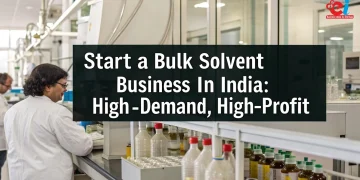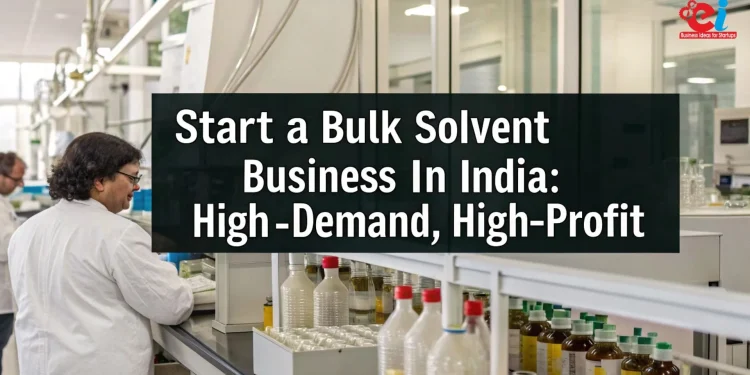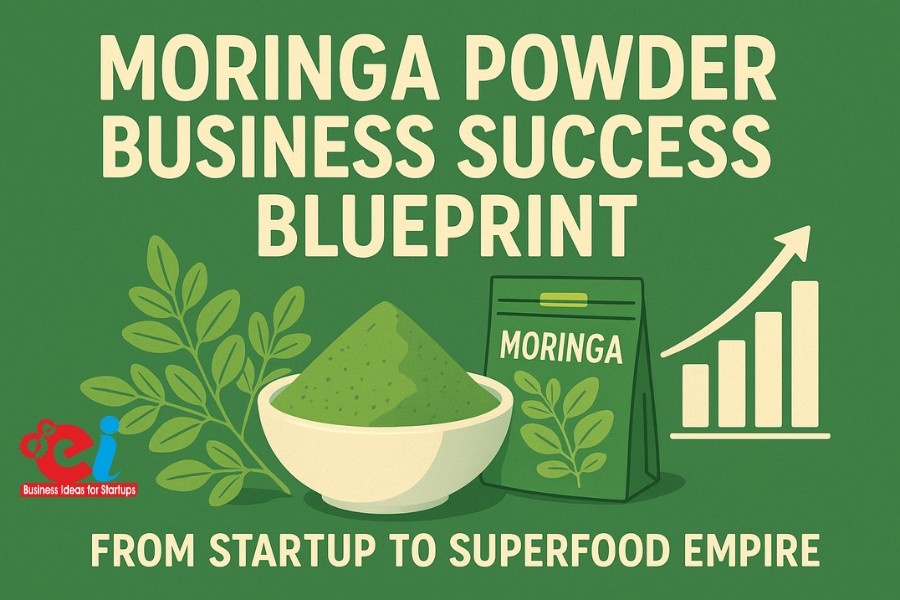India’s chemical manufacturing sector is now considered one of the strongest in the world because of its well-developed infrastructure, trained workforce, and low prices for raw material procurement.
The bulk solvent subsector, however, stands out as one of the most lucrative, easily scalable, and export-ready out of all the subsectors of chemicals which is not being fully utilized by new and emerging players.
Acetone, Isopropyl Alcohol (IPA), and Methanol not only have significant demand in the industrial sector, but considering their ever-increasing demand, also provide a steady foundation for entrepreneurs hoping to establish a profitable venture in the chemicals business.
In this article, I have sought to describe the current market trends, leading products along with their trade values, and startup prospects in the bulk solvents industry. I also provide a detailed strategy for aspiring chemical entrepreneurs aiming to enter and grow in this segment.
Reasons for Considering Bulk Solvents as the Starting Point
The major domains bulk solvents serve like: pharmaceuticals, paints and coatings, adhesives, textiles, personal care, agrochemicals, and printing make and consume solvents in mass volumes across the globe.
These products exhibit relatively inelastic demand, providing added robustness to a business even in tough market conditions.
Startups gain from:
- Sustained market need
- Repeat sales from business customers
- Suitability for micro and macro operations
- Storage and transport convenience in drums and tankers
- Availability of buyers from over 60 countries
With some market planning and proper compliance structures in place, domestic traders and startups could escalate entwined growth potential to become trusted international exporters.
Related: How Chemical Manufacturing is Adapting to Sustainable Chemical Manufacturing Practices
Top Bulk Acetone Solvents and Others in High Demand
According to the May 2025 issue of Chemical Weekly, some bulk solvents are traded consistently across India and abroad. Here are some key products which every entrepreneur need to think about:
- Acetone – A critical solvent for paints, coatings, adhesives, and pharmaceuticals. India exports acetone to the Middle East, Africa and parts of Southeast Asia.
- Isopropyl Alcohol (IPA) – Widely used as a disinfectant, cleaning agent, and in cosmetics. IPA use spiked during the pandemic and continues to see strong global consumption.
- Methanol – Used in the production of formaldehyde, fuels, plastics, and a precursor to acetic acid. Methanol is one of the most exported base solvents from India.
- Ethyl Acetate – Used in paints, printing inks, food grade flavoring and as a low toxicity solvent.
- Methylene Dichloride (MDC) – A potent solvent contained in paint strippers and aerosol products. MDC is particularly sought after in developed nations due to rampant industrial demand.
- Toluene and Xylene – Used in the synthesis of adhesives and incorporated in fuel blending. These are volume-driven products which secure constant cash inflow.
- Cyclohexanone – Used in the production of nylon and other synthetic fibers. It is also a key intermediate for some agrochemicals.
Each of the above said solvents provides an opportunity to enter the market depending on the available funding, network of buyers, and warehouse infrastructure.
India is listed in the top 5 economies exporting solvents like Ethyl Acetate, Acetone, and Methanol. Indian solvents are increasingly being used in African countries, ASEAN members, and the Middle East because of low prices compared to other countries and good quality.
Global Trade Trends
Trade analysts and reports on the chemical industry state that:
- The global solvent market is forecasted to grow with a CAGR of 5.4% up until 2030
- In FY2024, India’s exports of chemicals went above 30 billion USD, more than 15% of it coming from bulk solvents
- The fastest growing importers of Indian solvents are the GCC countries and East Africa
Renewable sources of solvents such as green and bio-based ones are gaining traction. Startups that target VOCs, water-based, or biodegradable solvents could be first movers in the sustainability-focused EU and Japanese markets.
Setting Up a Bulk Solvent Trading or Manufacturing Business
Two models come to mind: trading and manufacturing. Trading is best suited for newcomers, while manufacturing requires significant capital but has higher profit margins.
Basic Steps to Set Up
- Product Selection – Start small with 1–3 regionally popular products (Acetone in the Middle East and IPA in Europe).
- Supplier Tie-ups – Align with Indian suppliers like Deepak Nitrite and GNFC or Balaji Amines.
- Licensing & Compliance – Secure storage, transportation, and handling licenses under Petroleum Act, Factory Act, and local pollution control board.
- Packaging & Logistics – Ship using 200-liter drums, ISO tankers, or IBCs. Acquire warehouses bordering port or industrial areas.
- Marketing & Sales – Participate in chemical expos such as Chemexpo India, register on international B2B websites, and network through LinkedIn and trade fairs to connect with buyers.
Capital Necessities
- Trading: ₹25–40 lakhs (covers inventory, warehousing, licensing, and packaging)
- Small-scale manufacturing: ₹1.5–3 crore based on the product and level of automation employed
Profitability
- Trading margins: 8–12%
- Manufacturing gross margin: 20–30%
Related: Production of Chemicals
Challenges and Risk Mitigation
Despite the sector’s promise, startups are likely to face challenges such as:
- Raw material price instability
- Volatile foreign exchange rates
- Government policy restrictions
- High cost of flammable chemicals transportation
- Established market rival competition
Risk mitigation suggestions include:
- Fixed-rate contracts with suppliers and buyers
- Shipment and stock insured under chemical goods insurance
- Licensed third-party logistics (3PL) contractors for chemical transportation
- Implement storage cost minimization strategies using inventory management software
Entrepreneurs need to keep abreast of the news issued by BIS, REACH, and DGFT so as not to breach compliance on export restrictions.
Support NPCS Offers Chemical Startups
NIIR Project Consultancy Services (NPCS) has assisted and guided hundreds of start-ups venturing to the chemical industry. With their holistic know-how of the industry and access to international information, they are strategic partners to bulk solvent manufacturers.
Services for Startups in Bulk Solvent Trading
- Opportunity Mapping and Market Survey Reports
- Comprehensive DPRs (Detailed Project Reports) for both trading and manufacturing divisions
- Financial forecasting, ROI projections, and detailed payback period analysis
- Recommended layout for the plant with resource procurement and machinery recommendations
- Guidance on major solvents export strategies and HS codes
- Compliance advisory for the setup of the factory, pollution control measures, and other hazardous waste materials treatment
NPCS provides customized approaches that reduce risk and increase profitability for both small scale solvent warehouse distribution models and large scale production facilities.
Conclusion
The broad market for bulk solvents makes them an attractive starting point for chemical startups. Their extensive uses and steady demand, in addition to being easily scalable for export, make them enticing. Navigating licensing, sourcing, and compliance may be complex, but these challenges can be overcome to build a highly profitable business in a short time.
With NIIR Project Consultancy Services backing you, you can turn your solvent business idea into a strategically structured investment-ready project designed for the domestic and international markets. Now is the time to take advantage of India’s expanding position in the global supply chain of chemicals.


























